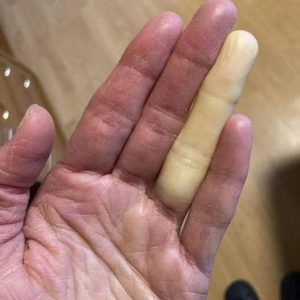I started showing up on Sundays with seven crimson roses, wrapped in the same brown paper she used to save and smooth. I’d set them in the vase, straighten the ribbon, tell her about my week. By Tuesday, they were gone—no wilted stems, no petals, just empty.
At first, I blamed the grounds crew or animals. But only her grave was always spotless. So I set up a trail cam, hidden in the hedge, and waited.
On the third day, a boy appeared—about eleven, wearing a hoodie and shorts despite the season. He lifted the roses carefully, like something fragile, then came back the next day to sit quietly with them for twenty-three minutes. He didn’t speak—just kept watch.
A glint at his chest caught my eye—a silver locket. I knew that locket; I’d bought it for Malini on our twentieth anniversary. How was it on a stranger’s neck?
I waited until he returned, notebook in hand, reading softly beside her stone. When I spoke, he flinched but didn’t run.
“You know her?” I asked.
“Sort of,” he said. “She told me this was a safe place. That I could talk here.”
His name was Reza Imtiaz—Mina’s grandson, Malini’s coworker who had visited during her chemo.
“The roses?” I asked.
“She said I could borrow them. To bring to my mom’s hospital room. Flowers make it smell like outside.”
His mother was in recovery, but he said Malini helped even when he couldn’t see her.
We made an unspoken pact. Every Sunday, I’d bring two bundles—one for Malini, one for Reza’s mom. We’d meet, read poems, share silence.
Months later, Reza’s mom thanked me with eyes full of relief. He eventually moved away, but every year on Malini’s birthday, a single rose appeared in the vase—never claimed, never needed to be.
As for the locket, I never asked for it back. Some things don’t belong buried. They do their best work carried forward, warm from a new heartbeat.
Grief is no longer a cliff but a coastline. You learn where to stand. And sometimes, the world gives you back what you thought was lost—carried by a boy in a hoodie with a notebook full of beginnings.





